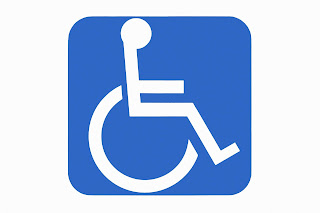Always
talk directly to the disabled and not only to a companion, as it is dismissive
behavior. Shake hands, if safe, fist or
elbow bump with those we meet is most polite, and the disability doesn't change
this fact—even if he/she has a prosthetic hand. Consider, in all cases,
how you would wish to be treated if you had a disability.
The Blind or Visually Impaired
Introduce yourself and anyone else accompanying you, ensuring the person knows you are talking to him. Don’t yell or raise your voice. Blindness doesn't imply hearing loss.
It
is not insulting to prevent a possible injury. Speak up if you see a
blind person walking into traffic or into an object. If known, call him
by name, especially when in a crowd.
Never
engage guide dogs. Don’t pet them or feed them. When they are
working, they are on the job.
When Guiding the Blind
Imagine
how frightened you would be if in a dark room and someone grabs you. With
that in mind, verbally offer your arm and never grab him. In detail, describe
items you see like large cracks in the ground to the right and that the curb is
two steps in front of him. When finished guiding, inform him of his
location. Ensure he is out of the flow of traffic where he won’t be hurt
or bumped.
Those Who are Deaf or Hard of Hearing
Many,
of all ages, are hard-of-hearing and most will lose the quality of our hearing
as we age. Thus, we should speak clearly to all.
If
it appears that the would-be-responder seems to be straining to hear you, move
to a quieter location.
With
those who are deaf, get his attention by tapping him on the shoulder or waving
a hand. Speak directly to the deaf without yelling. Take notes if you
don’t know sign language. Still, the deaf may communicate in other ways,
perhaps by using a specialized device. So, ask the person how he wishes
to communicate. Be observant.
Speech Impediments
Because
it is annoying and impolite to finish a person’s sentences, correct him, or use
condescending language, use your utmost patience with those who stutter or have
other speech impediments. Most likely, he knows he is difficult to
understand. Ask him to repeat anything you didn’t understand and repeat
what you think you have heard. Listen intently for the person to complete
his entire sentence.
There are helpful devices, such as the speech-to-speech relay when using a telephone. If you are in contact with someone who has difficulty speaking, it may be best to suggest using the service, which is free. For more information, please visit http://www.fcc.gov/cgb/dro/sts.html
The Mobility Impaired
Because
cane and walker users often have balance issues, do not grab, or attempt to
move them as it may frighten them. Offering your arm is most polite. Although it is polite to open doors for others,
inform the mobility impaired before doing so.
They could reach for the door and fall as it opens.
Do
not pat wheelchair users on the head, lean on their chairs, lean over them, or
ask them to hold something for you just because they have a chair. It is
condescending. Do not push the wheelchair—even if the person has accepted
your offer for assistance—without instruction. You could dump them out of
the chair or damage it.
Offer
to move items in the path of a wheelchair user. Moreover, offer to hand
out-of-reach items to him. To save the chaired neck strain, and be on his
level, sit when talking to him.
Final Note
Some
of the many types of disabilities are hidden. For example, those with
multiple sclerosis may seem fine one day but require a wheelchair the next.
Minimizing their need for the chair on that day, as if they’re playing
the sympathy card, is simply wrong—and vile. Always, in all situations,
remember to empathize and ask yourself how you would like to be treated.
Interview:
business meals & handshakes
Good Manners
Matter For Realtors
How to Deal With
Irritating, Loud, Sick and Clueless Coworkers

Comments
Post a Comment